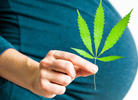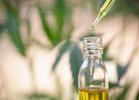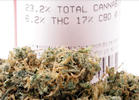
Just 12 months ago, most people had never heard of CBD oil and weren’t aware of its benefits. Today, you’ll be hard-pressed to find a wellness product that isn’t infused with the non-intoxicating cannabis derivative. Analysts currently estimate the CBD industry is worth around $1 billion in the United States and predict it will rise to $22 billion in the next five years.
In May, the Food and Drug Administration held a public hearing to establish whether or not CBD was being used in products in a way that was safe for consumers. The hearing examined the use of CBD in food, beverages and beauty products. Experts testified about potential dangers of recommended daily dosages and some stated that CBD is often added to products as nothing more than a marketing ploy.
The CBD edibles industry has experienced a number of crackdowns from state and government officials. New York City established a formal ban on CBD edibles in July, and in Massachusetts a similar ban is causing outrage among vendors. The official line is that, while hemp was made federally legal by the 2018 Farm Bill, it was not approved as a food additive. While CBD derived from hemp is legal, CBD derived from cannabis is not.
CBD Water to the Rescue
Despite these challenges, the range of CBD products – from bath bombs and transdermal patches to lotions and CBD vapes – is growing and diversifying by the day. One of the latest items to join the growing list of products is CBD or hemp water.
For years, health and wellness gurus have promoted infusing drinking water, sports drinks and club sodas with the flavors, vitamins, minerals and other nutrients in fruits and vegetables. The concept of infusing water with CBD oil is no different.
CBD stands for cannabidiol; it’s one of the many compounds found in cannabis and hemp plants. There are more than a hundred other such compounds (called cannabinoids) in the plant. Studies have shown that CBD is rich in minerals, essential oils and fatty acids, all of which have their own nutritional value and medicinal benefits.
Unlike THC in cannabis, CBD doesn’t get you high. CBD reduces inflammation and pain, improves sleep, manage seizures in some kinds of epilepsy, eases the symptoms of anxiety and even improves one’s complexion. By drinking CBD water, you’ll enjoy these benefits and more.
There are a few different kinds of CBD oil though, and it’s important to understand the differences when shopping for your CBD product. CBD isolate is the purest form of the oil. It’s been heavily refined and all other substances have been extracted through a distillation process. Broad-spectrum CBD has been put through a lesser distillation process. It will still have some of the nutrients and cannabinoids found in the plant, but not all of them. Full-spectrum CBD, which has been through minimal distillation, contains the complete range of compounds, including some THC (although CBD products can only have a maximum of 0.3% THC by law). Full-spectrum CBD oil products are significantly more effective than isolate or broad-spectrum products
Why CBD Water Is Becoming So Popular
Most people carry bottled water in their bags and cars on a regular basis, so swapping regular water for a CBD-infused version is really no hassle at all.
A growing number of people are looking for natural remedies for chronic pain, arthritis or anxiety they can incorporate into their day-to-day lives. CBD is an alternative to addictive medications. That isn’t to say that CBD water is going to work as well as other CBD products. In fact, some critics argue that infused water products are an ineffective way to use CBD and that consumers would be better off buying a tincture or capsules for maximum results. Nonetheless, consumers are keen to try CBD water in the hopes that it might make everyday life a little easier.






